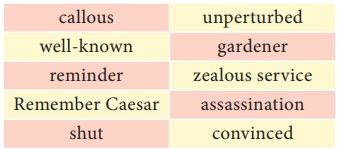Remember Caesar (Play) | Supplementary/Story | By Gordon Daviot - Questions Answers | 12th English : UNIT 6 : Supplementary/Story : Remember Caesar (Play)
Chapter: 12th English : UNIT 6 : Supplementary/Story : Remember Caesar (Play)
Questions Answers
1. Complete the summary of the play, choosing the appropriate words from the list given below the passage.
Lord Weston was a (1) well-known judge in England. Being pompous and vain, he told his secretary Roger that he had attained glory by hard work and (2) zealous service . He expressed his displeasure over Roger’s request for a half-holiday. Suddenly, he discovered a piece of paper with the words (3) Remember caesar in his pocket, and he feared that the message was a warning conveyed by his enemies who had received legal punishments from him. As the message was sent on the 15th of March, (the day Julius Caesar was assassinated), he was (4) convinced that someone affected by his fair judgement was plotting his murder. Sensing the definite attack, Lord Weston ordered his secretary to (5) shut all the doors and windows. But his wife remained (6) unperturbed by the threat. So, Lord Weston was angered by her (7) callous reaction. He ordered Roger to send the cook and the (8) gardener away. Both Weston and Roger took elaborate precautionary measures to thwart the (9) assassination attempt. Finally, Weston was able to recollect that he had written the message “Remember Caesar” himself as a (10) reminder. Caesar was actually a gardener who had an appointment to visit Weston’s garden. The play revolves around Weston’s absent -mindedness which is the crux of the play.

2. Based on your understanding of the text, answer the following questions briefly.
a. How did Lord Weston describe himself?
Lord Weston had attained
glory by his hard work and zealous service.
b. How did Roger react to Lord Weston’s advice?
Roger didn’t heed Lord Weston’s advice.
c. What made Lord Weston think that his life was in danger?
Lord Weston discovered a
piece of paper with the words “Remember Caeser” in his pocket. He feared
that the message was a warning conveyed by his enemies. It made Lord
Weston think that his life was in danger.
d. Why was the speaker keen to know what day it was?
The reader thought that the
message “Remember Caeser” was warning conveyed by his enemies, as it was the 15th of March, the day Julius Caesar
was assasinated. He feared that someone was plotting to murder him.
e. Mention the immediate steps taken by Lord Weston to protect himself from his assassin.
Lord Weston ordered his
Secretary to shut all the doors and windows. He ordered Roger to send
the cook and the gardener away. These are the immediate steps taken by Lord
Weston to protect himself from his assassin.
f. Do you think that Lady Weston did not care about the threat to her husband? State reasons.
Yes. When she heard her husband’s life is in danger, she
commented that the last time his life was in danger he had been eating a
game-pie. When Weston ordered to shut, all the doors and windows, Lady
Weston worried about Mr.Gammons’ boy who will come with the groceries.
g. How did Lord Weston ‘defuse’ the ‘infernal machine’?
Lord Weston inserted the
inferanl machine in to a pail of water at full stretch of his arm and put a
pack of books heavy on top to keep it down.
h. Whose life was of ‘great value’ to England? In what way?
Lord Weston’s life was of great value to England because he was
a pompous and strict judge.
i. Why did the speaker consider his life less important?
The speaker said that Roger
was young. There are still great things for Roger to do in the
world. So he thought that Roger must live and write his life for posterity.
j. Who reminded Lord Weston about Mr. Caesar?
Roger reminded Lord Weston about Mr.Caesar.
k. What was the truth about the crumpled piece of paper?
The note “Remember
Caesar” was written by Lord Weston at the time of his busy morning. He forgot
it. This was the truth about the crumpled piece of paper.
l. Bring out the irony in the message “Remember Caesar”.
The speaker actually forgot
the note “Remember Caesar” what he wrote at the time of his busy morning. Though
the note was a reminder, his absent mindedness and forgetfulness was
the irony in the message Remember Caesar.
3. Based on your understanding of the play, complete the Graphic Organiser (GO) suitably.

Title: Remember Caesar
Author: Gordon Daviot
Setting:
• Lord Weston’s house
• Lord Weston is a judge.
• On seeing a note ‘Remember Caesar’, he suspected somebody would going to assassinate him.
• The precautions he took with his assistant led the chaos.
Characters:
• Lord Weston
• Lady Weston
• Roger Chetwynd
• Joel
• Mr.Gammon’s boy
• Mr.Caesar
Climax:
• The note “Remember Caesar” was written by Lord Weston at the time of his busy morning.
• He forgot it.
• Lord Weston’s absent mindedness and forgetfulness created all the chaos.
Humorous elements:
• Lady Weston’s comment of ‘the danger in eating a game-pie’
• Her thoughts over the groceries rather than her husband’s life
• The incidents that happened at the time of diffusing the infernal machine
4. Answer the following questions in a paragraph about 150 words each.
a) “Remember Caesar” is a light hearted comedy. Discuss the statement in a group and identify various aspects such as title, plot and characterisation that contribute to the humour in the play.
· Title
The speaker actually forgot the note ‘Remember Caesar’ what he wrote at
the time of his busy morning. Though the note was a reminder, his absent
mindedness and forgetfulness the irony in the message ‘Remember Caesar’.
· Plot
Lord Weston discovered a piece of paper with the words ‘‘Remember
Caeser’ in his pocket. He feared that the message was a warning conveyed by his
enemies. The speaker actually forgot the note “Remember Caesar” what he wrote
at the time of his busy morning. Though the note was a reminder, his absent
mindedness and forgetfulness was the irony in the message Remember Caesar.
· Characterisation
Lord Weston
an absent minded judge made all havoc in the story was really a humourous
character. Being a judge he used his intelligence to stop his assasination by
the enemies. But his absent mindedness made all his attempte futile and it made
him a joker.
Roger -
being a secretary to Lord Weston enacted upon all his master’s orders. He was
blind with dedication to his master. He assisted with Weston in all the havoc.
He was also humourosly pictured in this story. Lady Weston, Weston’s wife
Francies had been fed up with her husband’s tomfooleries.
b) Compare the character traits of Lord Weston and his wife.
· Character
traits of Lord Weston
On seeing
the note ‘Remember Caesar’ which appeared to be a threat against his life, Lord
Weston behaved quite irrationally. He was panic-stricken. He sent his terror in
to the house. He ordered Roger to shut all the doors and windows. He sent his
gardener out and called his wife in. He took out his pistol and shouted at the
imaginary enemy. A well reputed judge Lord Weston made a mock hero out of him.
· Lady Weston
Lord Weston’s wife Francies had been fed up with
her husband’s tomfooleries. She spoke as if she too had believed that the
message posed immediate threat to Weston’s life. But she was frivolous. She was
unmoved at the alarm raised by her husband and Roger. She was playful at his
haste and fears. Because she was used to mock her husband’s raising alarm at
follish suspicions. She behaved quite gently even at the sight of their expensive
books drowned in water and her daffodils lay all ruined.
c) Group Work
The play revolves around a ‘perceived threat’ and how Lord Weston and Lady Weston react to it. Let’s reverse their roles. Imagine a panic-stricken Lady Weston and a frivolous Lord Weston. Read the following piece of dialogue from the play and rewrite it to suit the changed roles.
WESTON: My dear, your husband’s life is in grave danger.
LADY WESTON: The last time it was in danger you had been eating game pie. What is it this time?
WESTON (annihilating her flippancy with one broadside): Assassination!
LADY WESTON: Well, well! You always wanted to be a great man and now you have got your wish!
WESTON: What do you mean?
LADY WESTON: They don’t assassinate anybody.
ESSAY
• Introduction:
• A note of ‘Remember Caesar’
• Chaos in the house
• Remember Caesar - an irony
• Conclusion
Introduction:
The play
“Remember Caesar” is a comedy about an absent minded and forgetful judge, Lord
Weston.
A note of
‘Remember Caesar’:
Lord Weston
discovered a piece of paper with the words 'Remember caesar' in his pocket. He feared that the message was a warning conveyed by his enemies. As the
message was sent on the 15th of March the day Julius Caesar was assassinated,
he was convinced that someone was plotting his murder.
Chaos in the
house:
Sensing the
definite attack, Lord Weston ordered his secretary to shut all the doors and
windows. He was panic-stricken. But his wife remained unperturbed by the
threat. She was frivolous. He ordered Roger to send the cook and the gardener
away. Both Weston and Roger took elaborate precautionary measures to thwart the
assassination attempt.
Remember
Caesar - an irony:
Mr.Caesar
was actually a gardener who had an appointment to visit Weston’s garden. The
speaker actually forgot the note “Remember Caesar”, what he wrote at the time
of his, busy morning.
Conclusion:
Though the note was a reminder, his absent mindedness and forgetfulness
was the irony in the message Remember Caesar.
FORGETFULNESS IS A FORM OF
FREEDOM, BUT NOT TO OTHERS.
Related Topics